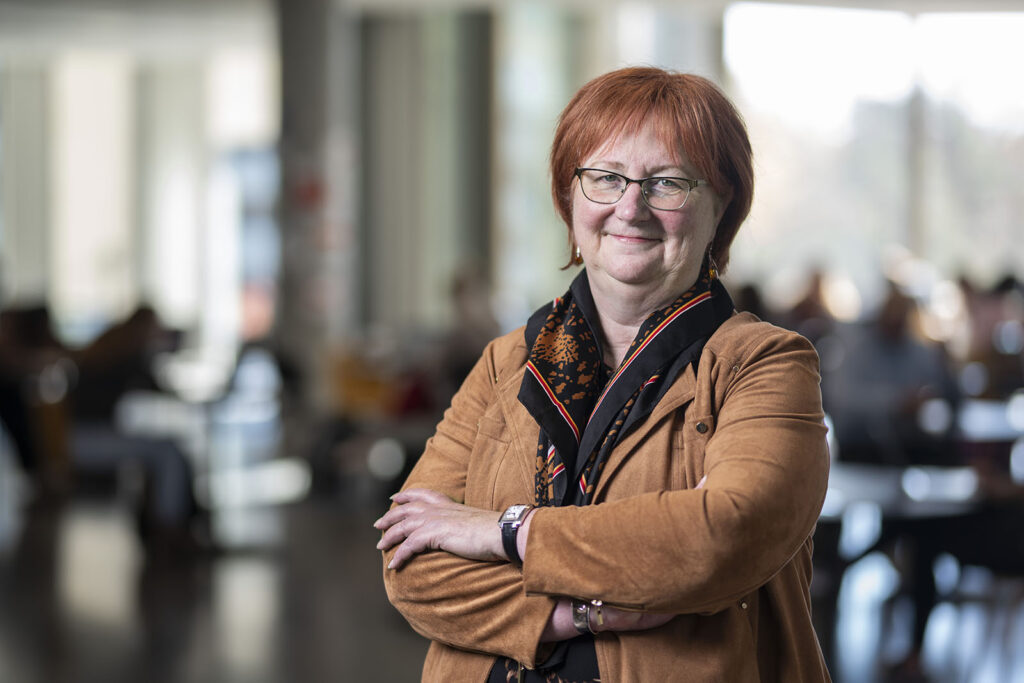Exploring the History of Marketing and Its Value to Today’s Business Strategies
“The past is where you learned the lesson. The present and future are where you apply the lesson.”
Author unknown

Leighann Neilson, associate professor of marketing, is one of those people that draw you into her story about her life and academic journey—one that is peppered with so many unique and interesting experiences and serendipitous moments. It is a journey that defies the stereotypical trajectory one might take to get to professorship in business, but that is what makes Leighann’s knowledge and research program so robust and valuable.
Leighann will be the first to tell you that she loves academia, but in a think-outside-the-box kind of way and her research interests certainly support this ideology. Leighann’s research program predominately focuses on the history of marketing, but she also explores other consumer-related themes from purist and theoretical perspectives and that allows for a multidisciplinary approach. Leighann describes her research as, “rooted in Canada, uncovering the history of feminism in business, and a storyteller who highlights historic figures in marketing and links them together.”
Leighann’s main research projects look at the historic dimensions of marketing through a multidisciplinary lens (sociology, art history, anthropology). She studies Canadians such as John Murray Gibbon, a publicity agent for CP Rail, Caroline Borden Hinman, an outback excursions entrepreneur, and Tom Thompson of the Group of Seven artists—all during the early 1900s. And, although they are all seemingly independent figures in history, Leighann has both successfully tied their business experiences together and shown how they were essentially cultural mediators—facilitating one’s ability to sell an idea. But she has also shown how valuable their contributions have been to understanding business and marketing theories today.
For example, John Gibbon wrote a book called, The Canadian Mosaic (1938) that offered up a unique and healthy perspective on the value of a culture comprised of people from different backgrounds and experiences. “It was a handbook for political marketing in Canada that resonates still today, so if someone like Gibbon can influence our immigration policy, and our vision of what it means to be Canadian—the mosaic versus the melting pot—then it highlights the need to stay open-minded, robust, and intensive with our research goals and vision.”
And, while researching Gibbon, she discovered Caroline Borden Hinman and fell in love with her story and life journey. Hinman ran an outback trekking excursion in the Rocky Mountains in the early 1900s for four decades—and was immensely successful at it. Being a strong feminist and advocate for highlighting women’s contribution in business (past and present), Leighann wanted to understand this woman who defied the odds of her time by not only being a woman entrepreneur, but by doing things women simply did not do (including wearing pants!). Hinman was a woman who broke stereotypes and expectations of women in business and Leighann’s research aims at bringing such stories to the forefront of business knowledge because it contributes to our understanding of entrepreneurial strategies and, “there are very few accounts in the literature of female entrepreneurs who also contributed to social and economic development.”
Leighann sees the history of marketing as the key to unlocking our understanding of business because by understanding the past and those that contributed—both practically and theoretically—it offers up a much deeper perspective on how to evaluate our knowledge today. Leighann’s deep dive into understanding the genealogical aspects of marketing theorists propels her to share with her graduate students to go as far back in history to truly understand:
“To pinpoint knowledge in a moment in time is short-sighted. There is always a before and an after. By exploring ideas, theories, and practices from the beginning, one can gain so much more out of what they’re studying. Multiple perspectives, a deep understanding of the discipline, and who contributed is so very valuable.”
Concurrently, Leighann is excited to embark on a freshly awarded Scholarship of Teaching and Learning (SoTL) Grant to support a cross-disciplinary project (sociology and anthropology) that will explore how students from equity deserving groups experience Carleton University’s research-based graduate programs. Leighann’s contribution to this study will focus on women and the intersection of gender with race.
“Through this research, we seek to investigate the dual experience of many graduate students as both learners and teachers within the context of ongoing racialized and gender-based disparity in Canadian universities.”
The research is extremely valuable as Canada faces many challenges with ongoing systemic racism and inequitable issues pervasive within many Canadian settings.
Leighann is truly passionate about the genealogy of knowledge and our intellectual ancestors—the people who shaped marketing from the beginning. Plus, marketing history is where Leighann has found her fellowship—the people and academic space where she belongs. And she tells her students they should “respect who went before and appreciate their value. That is learning.”